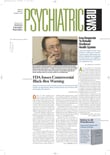A significant proportion of patients with recurrent depression might be able to withdraw from medication successfully and stay well for at least six years with a focused course of cognitive-behavioral therapy (CBT), according to a report in the October American Journal of Psychiatry.
The study compared short-term CBT (10 30-minute sessions once every other week) versus standard clinical management following successful treatment of a depressive episode with psychopharmacology.
“Cognitive-behavior treatment was found to be effective in decreasing the residual symptoms of depression,” the authors wrote. “By deferring psychotherapeutic intervention until after pharmacotherapy, we were able to provide a less intense course of therapy than is customary. .because psychotherapy could concentrate only on the symptoms that did not abate after pharmacotherapy.”
The lead author was Giovanni A. Fava, M.D., of the department of psychology at the University of Bologna, Italy. His colleagues included researchers at the University of Bologna, the department of psychiatry at the State University of New York at Buffalo, and the department of statistical sciences at the University of Padova, Italy.
Extending Follow-Up to Six Years
Fava and colleagues designed their study as an extension of the 1990 study“ Three-Year Outcome for Maintenance Therapies in Recurrent Depression,” which appeared in the December 1990 Archives of General Psychiatry. That study found that a sequential approach to treatment of recurrent depression, using pharmacotherapy in the acute phase and CBT for residual symptoms, resulted in a significantly lower relapse rate at two-year follow-up.
In the current study, Fava and colleagues used a similar design to report six-year outcomes of CBT for prevention of relapse.
Forty patients who were diagnosed with recurrent major depression and had been successfully treated with antidepressant drugs were randomly assigned to either CBT or clinical management; in both groups, antidepressant drugs were tapered and discontinued. A six-year follow-up was undertaken, during which no antidepressant drugs were used except in the case of a relapse.
Criteria for inclusion in the study included, in addition to successful psychopharmacologic treatment of the most recent depressive episode, the following: a current diagnosis of major depressive disorder, a third or subsequent episode of depression with the immediately preceding episode occurring no more than 2.5 years before the onset of the most recent episode, a minimum 10-week remission between the most recent episode and the immediately preceding episode, and a minimum global severity score of 7 for the most recent episode of depression.
Exclusion criteria included history of manic, hypomanic, or cyclothymic features; active drug or alcohol abuse or personality disorder; antecedent dysthymia; and active medical illness.
Fava and colleagues noted that the CBT group also received “lifestyle modification” and “well-being therapy.”
“Clinical experience has suggested... that recovered depressed patients are often unaware of the long-term consequences of a maladaptive lifestyle, which does not take chronic, minor life stress, interpersonal friction, excessive work,. .and inadequate rest into proper account,” the authors stated. “We postulated that both the presence of subsyndromal psychiatric symptoms and chronic stress exposure may cause. .fluctuating and heightened neural or endocrine responses resulting from environmental challenge.”
They added that treatment aimed specifically at restoration of positive functioning is also vital. “A specific well-being-enhancing psychotherapeutic strategy was the third main ingredient of the cognitive-behavior approach,” they stated.
Findings After Six Years
At six years the group receiving CBT had a significantly lower relapse rate (40 percent) than the clinical-management group (90 percent). When multiple recurrences were considered, the CBT group had a significantly lower number of relapses than the other group.
“The cognitive-behavior intervention provided in this report was quite brief,” the authors commented. “It is conceivable. .that even better results might have been obtained with longer courses of cognitive-behavior treatment and if patients beginning to experience signs and symptoms of relapse had received additional booster sessions of therapy.”
Am J Psychiatry 2004 161 1872
